One of the biggest claims that hardline cryptocurrency aficionados offer is that cryptocurrency (and Bitcoin in particular) is regulation proof. It was a selling point for me back in 2014. You can’t regulate what you can’t find and decentralization comes specifically from that. The only way regulators could get at crypto is through the access portals—the exchanges, the ATMs, any business dealings, and through banks.
It’s also my key reason for never ever buying anything Ripple related, including XRP. Ripple Labs is located in San Francisco. It has a board of directors, and a CEO, and presumably brick and mortar meat-space land where they do business. Decentralization (and distribution) generally refers to a distribution of nodes involved in verification of the contents of the blockchain, but it should also be extended to include any company with a central office that could be shut down or unduly influenced by an overzealous regulation happy government body.
Like the SEC is trying to do right now to Ripple Labs and Coinbase (COIN.Q)
Here’s Ripple’s CEO, Brad Garlinghouse:
The SEC’s continued warfare on crypto continues to play out. In Dec 2020, I said that we’d been having discussions with the SEC for nearly 3 years about XRP, “..and yet never been met with clarity.” Sound familiar!? 1/2 https://t.co/wGHW4hCW2T
— Brad Garlinghouse (@bgarlinghouse) September 8, 2021
That particular fustercluck was over whether or not XRP was a security, which despite being a valid question, actually veils the prospects of a regulatory body getting their claws into a decentralized cryptocurrency. For Coinbase, things are a little different:
They received a notice of a potential enforcement action from the SEC about its interest-earning product, Coinbase Lend, which they were going to launch in the next few weeks. The product allows for users to earn a 4% yield on the USDC stablecoin by letting Coinbase lend it out to borrowers. This isn’t an uncommon tactic, as its used by companies like BlockFi and Gemini, which offers similar high yields on stablecoin and other crypto balances.
The company reached out to the SEC for a briefing prior to the launch, and the regulator’s response was that the Lend feature was a security. Um. What? Naturally baffled, Coinbase asked the SEC what the hell they were on, and the agency responded with a list of demands, because of course they did.
This is the reason we will always have decentralized currencies—because governments are frequently ridiculous.
Naturally, Coinbase shares fell, but that’s nothing new.

Global Cannabis gets Israeli OK for Efixii tech
On the opposite side of regulation happy governments. Global Cannabis Applications (APP.C) got the formal nod from the government of Israel for their Efixii blockchain-based cannabis compliance tech, which they can now use to help Israeli cultivators in carrying out cannabis cultivation research.
Israeli-based Bless Cultivation, a client GCAC picked up last year, received approval from the Israeli Medical Cannabis Unit to formally research “production capacity of cuttings from a mother plant, without creating a stressful situation for the source plant, as a function of time.” One of the prerequisites of said study involved using Efixii blockchain mobile app for managing, recording and delivering insights across all the study periods.
“Understanding production capacity of cuttings from a mother plant without stressing the plant will help us develop improved product consistency. Efixii is the only service with the power to record and thoroughly analyse this process all with complete blockchain transparency. This helped us secure approval from the regulator as they are confident in the tamper-proof data Efixii provides,” said Nadav Segal, founder of Bless and VP of research and development.
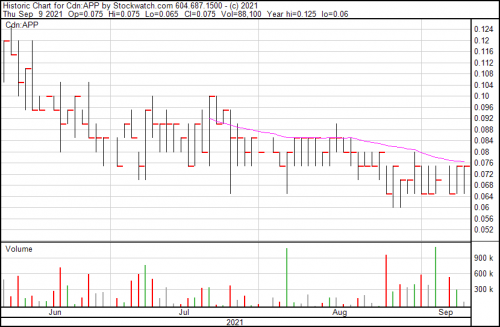
Future Fintech buys a UK-based exchange
Future Fintech (FTFT.Q) bought a 100% stake in Kyber Money Exchange from Rahim Shah this week. There’s not much mystery as to what Future Fintech is into. They’re a blockchain based e-commerce business and fintech service provider. They’re based in China
and given China’s recent regulation of Bitcoin and other cryptocurrencies, there’s some general curiosity about what might be in Future Fintech’s future.
Regardless,
“We are pleased about this acquisition as it further extends our fintech footprint and further diversifies our geographical reach. We believe that money payment services are a high margin business that will enable us to capitalize upon an increasing level of international business transactions and money flows. We believe that it will be synergistic with other financial service businesses that we are developing,” said Shanchun Huang, CEO of Future Fintech.
Khyber Exchange is a money transfer company where customers can do the deed through either brick and mortar locations or an online portal, mobile platform or over the phone. Their headquarters is in the UK with offices in Germany and Italy.
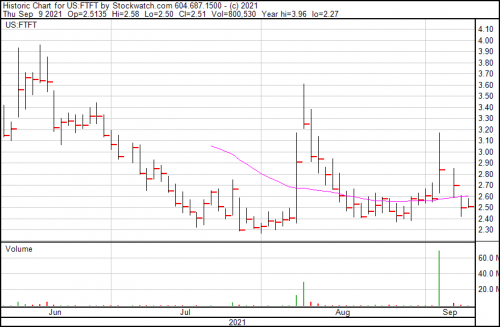
Non Fungible Tokens
Does anyone remember Maxim magazine?
This next one doesn’t keep with the regulation theme, but it is worthwhile to discuss.
ZK International (ZKIN.Q) subsidiary xSigma Collectibles, is launching a new non-fungible token (NFT) marketplace and platform in a partnership with Maxim.com.
You probably remember Maxim from the late nineties and throughout the oughts when it tried its best to be a steamy non-pornographic men’s magazine. It’s apparently still around, or ZK wouldn’t have been able to partner with it.
“I’m happy to join the innovative team at MaximNFT and xSigma, and to lead the strategic partnerships, content creation and collaborations with top-tier brands and celebrities. This opportunity fits incredibly well with my previous experience. MaximNFT combines Maxim’s long history and its multimillion reader base with xSigma’s strong expertise and resources. I’m proud to be the CEO of the project that brought these two companies together and I believe we are well-positioned to lead the rapidly growing industry with our innovations. MaximNFT is getting ready to impress the community soon,” said Jon Orlando, the CEO of MaximNFT, who they also onboarded to spearhead this enterprise.
The marketplace will be available next fall making NFT series for celebrities, athletes and brands, which they’ll announce when they get them. Before this, xSigma and Maxim.com pulled in an agreement for the rebrand to MaximNFT. Nothing in particular surprises me about what’s going on with the NFT space. What does surprise me is that there are still people out there who read Maxim.

Color Star Technology finally uses NFT for something worthwhile
Most companies into NFT’s are there to capitalize on the hype. They see the frothy market and want in, but non-fungible tokens, by and large, are like digital tulips, or maybe digital pogs might be a better fit. They’re a fad that’s going to stick around, draw some heat, release very little actual value, and then go away.
Then they’ll emerge post-bubble and companies like Color Star Technology (CSCW.Q) will find their actual use value. First, they’re an entertainment technology company finding novel ways to use tech and artificial intelligence in the entertainment industry. What they’ve done is take all of their musical copyrights on their celebrity interactive platform, Color Star APP, and launch them as NFTs.
Not exactly Lebron James stylized NFT dunk or some weird pixellated cat you’ll find in online shops going for $30,000, but an actual use for the technology. By putting their copyrights on the blockchain and spitting them out as NFTs, they’ve codified them, rendered them immutable and provided another layer of protection for artists for their art.
“Traditionally, the entertainment industry has mainly operated offline. However, since the pandemic, Color Star has worked hard to evolve and adapt to the changing landscape of entertainment. We have been working tirelessly to develop and expand the Company’s offline entertainment products and services through scientific and technological means to create an exceptional online experience for our users. Color Star has also been vigorously acquiring music, movie, and TV copyrights to make our copyright library more complete and diverse. While increasing our ownership of original works, we are using NFT technology to launch these copyrights, allowing better protection for authors and purchasers. We have also signed cooperation agreements with many professional NFT institutions around the world, and will launch more NFT entertainment products for our users to choose from in the future,” said Basil Wilson, CEO of Color Star.
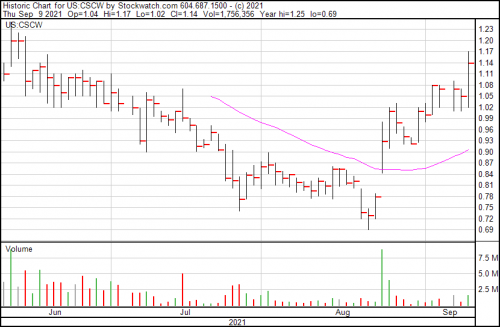
NFT collectible company kicks off game of greater fool hot potato
Cosmos Group Holdings (COSG.OTC) subsidiary Metaverse Blockchain Company Coinllectibles announced the sale of their first Fusion NFT. The buy paid USD$100,000 (or 28 ETH) for a pair of heritage ceramics and it was almost twice the collectible’s valuation price. Surprising nobody, the buyer then turned around and put the piece on a secondary market looking to resell it for $150,000 in case there was an bigger fool than him out there in the market for a digital hot potato.
Here’s Toby O’Connor, Coinllectibles CEO:
“Coinllectibles™️ , our first Fusion NFT™️, had a fixed price of more than US$100,000 (based on 28ETH); while we adopted an auction format for our second and third Fusion NFTs™️. The fact that we managed to sell it at almost twice the valuation price suggests that there is demand for quality Fusion NFTs™️, which are backed by physical collectible pieces. It also tells us that NFT collectors are realising the importance of having robust and legally comprehensive documentation within the NFT, which is the gap that our Fusion NFTs™️ perfectly fits. Admittedly, we are still in early days and we have 2 more pieces to sell. Nonetheless, these are very encouraging results – especially on the first day.”
Someone is going to get caught with their pants down when this bubble bursts. Until then, though, game on, I guess. Just make sure you’re not left holding the bag when the froth is gone.

Miners
Business as usual at Riot Blockchain
Riot Blockchain (RIOT.Q) anticipates their 3,600 S19 Pro Antiminers (giving them 110 Terrahash of support), which they recently received at their Whinstone Facility in Texas, should be online by the end of September 2021. That number brings their total fleet to 25,650 Antminers in operation, pulling in 83 megawatts of energy, with an estimated hashrate of 2.6 exahash per second.
Production and Operations Updates
- In August 2021, Riot produced 441 BTC, an increase of approximately 451% over its August 2020 production of 80 BTC.
- Year to date through August 2021, the Company produced a total of 2,051 BTC, an increase of approximately 221% over its production during the same 2020 period of 639 BTC.
- As of August 31, 2021, Riot held approximately 3,128 BTC, all of which were produced by its self-mining operations.
- The Company currently has a deployed fleet of approximately 22,050 miners, with a hash rate capacity of 2.2 exahash per second (“EH/s”).
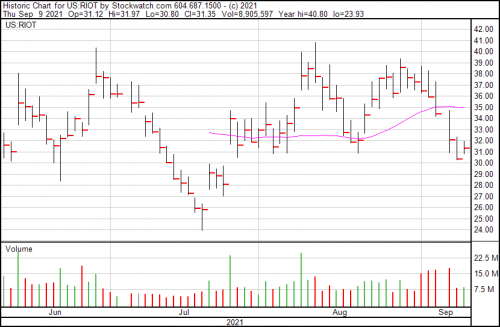
Luxxfolio spreads their crypto-bets around with new Ethereum miners
Luxxfolio Holdings (LUXX.C) subsidiary Westblock Capital bought Ethereum minin gand hosting equipment from Blackcloud, a cryptocurrency mining venture based in Alberta this week.
Now is as good a time as any to get into ethereum mining. Traditionally, it’s run as a correlation with Bitcoin and honestly this week is no different. We’ve seen sizeable dips in the price of ethereum alongside Bitcoin’s precipitous fall (and rebound) this week.

Sure. Ethereum’s price hasn’t exactly enjoyed a rebound back to its pre-dip prices, but miners for ETH should be thinking long term. If you’re convinced that Buterin’s going to make good on his promises and ETH 2.0 is going to meet all of its benchmarks, then getting in now is a fargone conclusion. If you’re skeptical (as I am) then maybe wait.
Luxxfolio isn’t waiting.
Their assets will include 136 Ethereum mining machines (8 AMD Radeon RX570 GPUs) , 25 ETH, and all the prior agreements the company made. They’ll deliver a hashrate of 220 MH/s, maintain lower power consumption (compared to Bitcoin) and use 217 KW of total power.
“We are exploring a number of diversification efforts and mining Ethereum is a natural fit into our operations. We also see staking and proof of work as complimentary to our mission. We will continue to explore integrating other mining operations as the industry continues to consolidate,” said Ken MacLean, President of LUXX Mining Division.
Get in while the getting’s good, because when staking goes widespread, all bets are off and your GPU’s will need to find a new purpose.
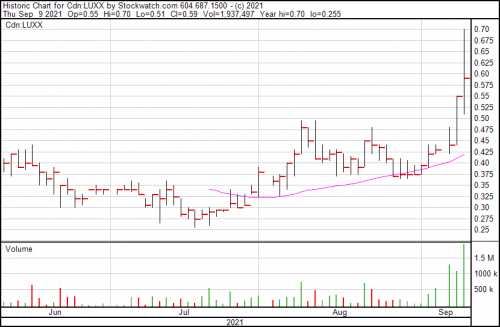
Neptune Digital levels up in the hashrate arms race
Neptune Digital Assets (NDA.V) added another set of Antminer S19 bitcoin ASIC rigs for its ever-expanding U.S. operations. The numbers of this acquisition should put them squarely in the centre of the pack for total hashrate and mining capability, but they’re certainly far from done.
“We are very pleased with our newest order of Antminer S19 Pro machines which will add another 53,000 TH/s of capacity to our existing 22,000 TH awaiting deployment. We continue to source the best machines at competitive pricing with our strong industry relationships and we are focused on scaling our bitcoin mining operations rapidly while keeping power costs as low as industry standards allow,” said Cale Moodie, Neptune chief executive officer.
The S19 is the right way to go when trying to fill out a Bitcoin mining fleet. The Antminer S19 Pro, produced by Bitmain, offers 100 terahash per second with an energy efficiency of 29.5 joules per terahash and a power consumption of 3,250 watts.
That’s honestly next to nothing when compared to Marathon Digital Holdings (MARA.Q) or Genesis, but it’s a good start.

DMG Blockchains Solutions dives head first into the Marapool
The Marapool is a United States based Bitcoin mining pool offered by Marathon Digital Holdings, that’s regularly audited by a third-party firm in the United States. It’s the Bitcoin mining sector’s answer to self regulation before big bad government can step in, and despite the sarcasm in the first clause of this sentence, it’s legitimately a good thing.
Why?
Because it’s a potential answer to the looming environmental threats posed by Bitcoin mining. DMG Blockchain Solutions (DMGI.V) has jumped into the Marapool with both feet, and is absolutely the first to do so, directing 100% of its hashrate towards the pool. Presumably, both companies are awaiting the arrival of other miners to take the plunge.
“After experiencing difficulties with mining pools outside the U.S., we decided to launch our own pool that would reflect the values and needs of enterprising North American Bitcoin miners. After many months of testing, we have now opened the pool to other Bitcoin miners that share our beliefs and our desire to improve miners’ processes. DMG Blockchain has long been an innovator in this regard, having worked closely with us on this initiative, and we are pleased to welcome them to MaraPool,” said Fred Thiel, Marathon’s CEO.
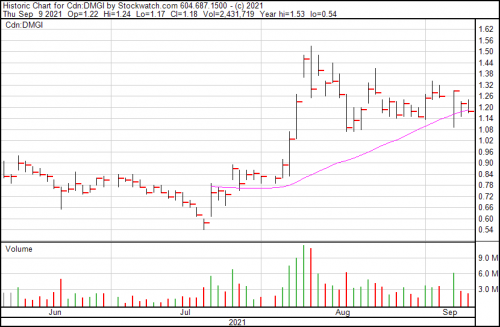
It likely won’t be long now before the SEC and other government bodies try to sink their regulation happy claws into crypto from every angle they can manage. Sometimes that’s for the best, as in curtailing Bitcoin miner’s excesses, and sometimes it’s ridiculous like what’s happening with Coinbase right now. But to quote the great Malcolm Reynolds of Firefly fame: governments are made to get in a man’s way.
For good or for ill, he’s not wrong.
—Joseph Morton


Leave a Reply